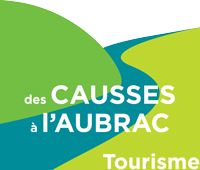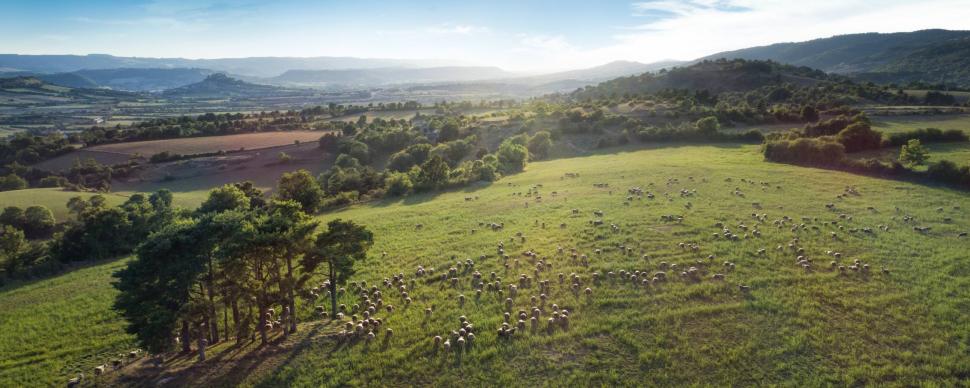Le Causse de Sévérac
DISCOVER
Bordered by the Aveyron and Serre rivers, the Causse de Sévérac is the gateway to the Grands Causses Regional Natural Park. It is a real journey through the centuries: from dolmens to Caussenard farms, walks and circuits will introduce you to its heritage, unusual landscapes and nature.

WHAT IS THE CAUSSE DE SÉVÉRAC?
The Grands Causses, shaped by pastoralism
The Grands Causses, or “qu’es aco,” as we would say here… These are arid plateaus with an altitude varying from 700 m to 1,250 m. They rest on a bedrock of limestone sediment from when the sea invaded the region 200 million years ago. Pastoralism has, for centuries, shaped these vast horizons covered with steppe lawns, with their undeniably rich landscape and biodiversity.
UNUSUAL
The hill on which the Château de Sévérac is located was once at the same altitude as the Causse de Sévérac limestone plateau, further north. The faults present on both sides moved, which levelled the ground. The drop made these two blocks sensitive to erosion and they settled at the level of what is now called the Causse de Sévérac. Erosion then carved the Butte de Sévérac. The more resistant granite base remained at the same height, as with the Causse de Sévérac.


THINGS TO SEE ON THE CAUSSE DE SÉVÉRAC
The Caussenarde house
The architecture of the Causses uses almost exclusively limestone The Caussenarde house is evidence of this. From the foundations to the lauze roofing, this typical house was traditionally made up of a sheepfold on the ground floor, with external steps leading upstairs to access the accommodation and the attic.
VAULTED FOUNTAINS
Man has sought ingenious ways to store water. Erosion has produced cracks in the causses, therefore water does not remain on the surface. It infiltrates, circulates under the surface through the cracks in the rock and leaves when the numerous sources rise Vaulted fountains were therefore built as close as possible to water points and have been used since time immemorial. This water was used for livestock and for washing the laundry.
You can see the vaulted fountains in our region on a hiking (14km) or driving (55km) circuit.


THE DOLMENS
The dolmens around Buzeins testify to a very ancient presence of man on the causse: between 3500 and 2200 BC approximately. The last stone dwellings of prehistoric man, the dolmens, were also the guardians of their way of life: the objects they protected now tell us about daily life for the first peasants on the Causses limestone plateau.
NOT TO BE MISSED
Discover the secrets of these stone tables by visiting the Maison des Dolmens. A Grands Causses Regional Natural Park discovery site, there is an exhibition on their construction and their purpose. 9 dolmens are featured around the Maison des Dolmens... So, follow the dolmen circuit on foot (9km) or by car (55km), available at the Tourist Office!
Then, explore Buzeins, the puech, its orientation tables and the Théron fountain.


OUR RECOMMENDATION
Take a digital walk with a panoramic view of the Causse de Sévérac
In partnership with the Grands Causses Regional Natural Park, two digital walks allow you to better understand the rich heritage of the Causses à l’Aubrac!
With your tablet or smartphone in hand, follow Guilhem le Berger. Games, puzzles, history and legends animate the experience.
Both playful and poetic, these walks will delight the whole family.
Free app ‘Balades des Grands Causses’ downloadable from Google Play and the App Store
Did you know? Pastoralism and agri-pastoralism
We use the term pastoralism to describe a farming system that uses the plant resources of a region to feed the livestock; and which, at the same time, maintains natural areas.
Heir to very old traditions of land and pasture development, this method of agriculture obeys geological, climatic and seasonal constraints, which oblige farmers to migrate according to the location and availability of resources.
Find out more about the causses limestone plateaus and agri-pastoralism


THE CAUSSE DE SÉVÉRAC FOR ACTIVITIES IN THE GREAT OUTDOORS
Even if the Causse de Sévérac is conducive to serenity and cultural discovery, it is also an ideal place to exercise in the heart of a magnificent natural area. Hiking, mountain biking, cycling, horse riding... Discover all the activities here (link to the ‘Nature and wellness section of our new site) in Causses à l’Aubrac.
To go further





